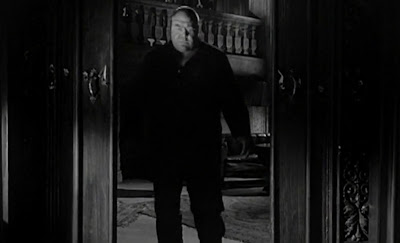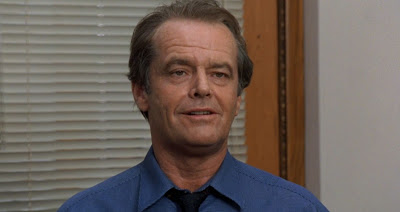THE HIGH AND THE MIGHTY (1954). Director: William A. Wellman.
"
The youth of man will never die unless he murders it."
NOTE: Some plot details are revealed in this review.This was a [near] disaster film made before the era of disaster films, based on a novel by the once-popular Ernest K. Gann. On a flight from Honolulu to San Francisco, various passengers share their stories, as some unspecified troubles begin, culminating in the loss of an engine and the possibility that they might not have enough fuel to make it to land -- which means they might wind up in the drink. No one can say with any certainty if the plane will float until help arrives, or break up and sink. On board we have a honeymoon couple, middle-aged couples, a woman who's in love with her boss, an aging gal, Sally (
Jan Sterling), meeting her future, younger husband for the first time, and so on. One thing the plane doesn't have is any chivalrous men. When Sally explains how nervous she is about meeting her guy considering she's a bit older than the only picture he has of her, neither the pilot Sullivan (
Robert Stack) or another male passenger ever tell her that she's still considerably attractive -- gee, what nice guys! When another woman, May (
Claire Trevor), betrays her terror of aging -- "no one's whistled at me in years" -- her male companion offers no compliments, either, despite her own good looks. The younger women, including the pretty and efficient stewardess (Julie Bishop) and the darling Miss Chen (Joy Kim) fare a bit better.
Sidney Blackmer of
Rosemary's Baby is aboard for a little melodrama involving his wife and her alleged lover,
David Brian, and there's also
Paul Kelly as a disaffected scientist. Loraine Day is a wealthy woman disgusted with her husband's financial decisions,
Phil Harris and
Ann Doran are disappointed middle-aged tourists; all are fine. William Campbell [
Dementia 13] has one of his best roles as an obnoxious younger pilot. The performances and the characterizations are actually pretty good, but
The High and the Mighty is only sporadically entertaining and suspenseful, and at nearly two and half hours in length is much too long and in fact fairly tedious for long stretches. But the main problem is that the movie has no pay-off and no real climax.
John Wayne -- did I forget to mention him? -- saves the day and that's that. You're happy for the characters but disappointed that there's so little life or death action. Wayne plays an older pilot who is haunted by the death of his wife and boy in a crash that he survived. When he thinks back on this event in a flashback, he furrows his brow to show that he's allegedly "haunted." He's better in scenes when he has to firmly and kindly reassure the passengers; in fact, for the most part he's not bad at all. Dimitri Tiomkin's Oscar-winning music score does most of the work in this movie, however.
Verdict: This is by no means a classic. **1/2.

























